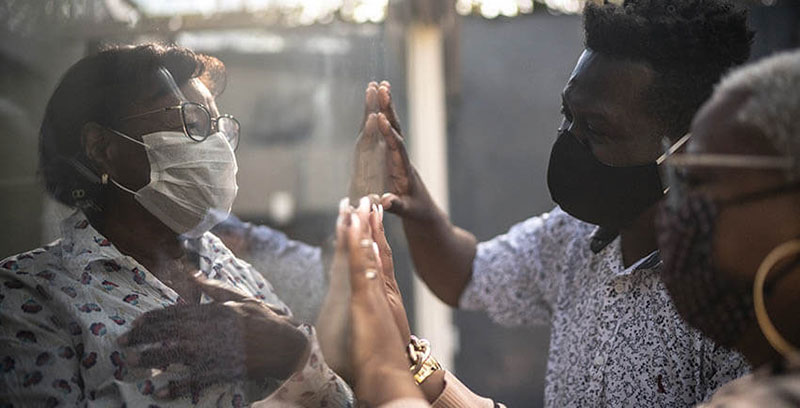How caregivers can protect someone with cancer from COVID-19
contributed by Nicole Fawcett

People with cancer or other health conditions are at increased risk of becoming severely ill from COVID-19. (The Centers for Disease Control and Prevention lists conditions with a known increased risk for severe COVID.)
About 40% of the population is considered at increased risk of severe illness from COVID-19. People with chronic health issues are 12 times more likely to die from COVID-19.
For those caring for someone with cancer, protecting your loved one from COVID-19 is critical.
Be a protector
People at average risk can take responsibility on behalf of a loved one with cancer by helping to limit their exposure to others. Wear a mask, social distance and plan to get a vaccine for the sake of your loved one. Go to the store or pharmacy to help that at-risk person avoid unnecessary trips out.
Protecting others is a sign of strength. Even if you’re not worried about your own safety, wearing a mask and social distancing could help protect a loved one who’s at risk. Vaccines are on the horizon, but it will likely be a while before the general public is fully vaccinated and life can go back to something more normal. And getting the vaccine will be important once it’s available.
In the meantime, if someone in your family is at increased risk of severe COVID, you can commit to creating a safe zone around them.
Be safer at home
- Organize your shopping list and make only 1 trip to the grocery store each week, instead of going multiple times
- Know the signs and symptoms of coronavirus. Monitor yourself and your loved ones. Keep anyone who’s sick away from your loved one with cancer.
- Participate in public contact tracing programs. This involves local health departments calling people who may have been exposed to COVID. If you get a call, answer. Learn more about the State of Michigan’s contract tracing efforts.
Be safer outside the home
- Plan ahead to limit your exposure to others. Do your shopping on a less-busy day instead of a weekend afternoon. Take advantage of stores that offer early shopping hours for people at increased risk.
- Follow best-practice guidelines when going out and exposed to others:
- Wear masks
- Wash hands frequently
- Maintain 6 feet of social distance
- Avoid crowds
- Keep up on the latest social distancing guidance from the CDC.
- Be a buffer around your loved one when they go out. Help them maintain 6 feet of social distance, be sure you and they both wear a mask, and keep them away from anyone who is not wearing a mask.
Navigate health care issues
- Monitor yourself and your loved one for symptoms of COVID-19. Be sensitive to any changes in health and take symptoms seriously.
- If you or your loved is showing symptoms of coronavirus, get tested immediately – don’t delay seeking care.
- Find ongoing support networks to help combat the loneliness and stress of caring for a loved one during a pandemic. The Rogel Cancer Center has compiled a series of coping resources.
Learn more about COVID-19, how it impacts cancer patients and get resources
Cancer care in the time of COVID-19
COVID-19 Vaccine Information and Update
Stress and Anxiety Management booklet
Don't Let the COVID-19 Pandemic Stop You From Getting Routine Cancer Screenings
Read about COVID-19 research at the Rogel Cancer Center
